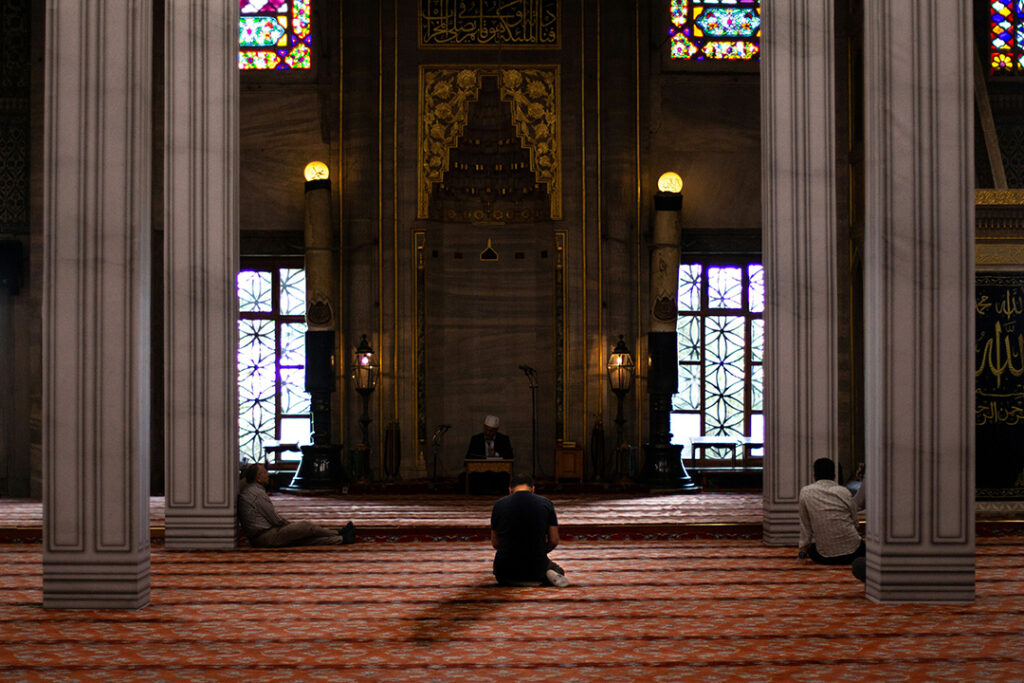Muslims across the EU will face likely increase in Islamophobia after 2024 elections
Muslims across the EU will face likely increase in Islamophobia after 2024 elections
Elections to the EU Parliament in 2024 look set to increase Islamophobia within the institution, presenting significant risks for European Muslims.
The rise in discrimination faced by European Muslims looks set to be reflected in elections to the EU parliament in June. A dual threat of rising far-right gains, accompanied by the impact this is having on mainstream parties, is contributing to concern over the normalisation of Islamophobia in Brussels.
This is not the only worrying trend. Alongside rising Islamophobia is a clear lack of representation for European Muslims in the EU’s institutions, a fact that only worsens the vulnerability of the community against such discriminatory narratives.
Polls deepen concerns
In June 2024, elections for the European Parliament will be held. Across the continent, citizens of the 27 member states will elect Members of the European Parliament (MEPs). Once elected, the MEPs sit in the parliament in groups based on their ideological positions. Europe-wide polls conducted in January 2024 paint a concerning picture for those seeking to combat Islamophobia.[1]
The Identity and Democracy group, representing the most far-right parties in the Parliament, is expected to double its share of MEPs, rising from 58 in 2019 to a projected 98 in 2024. Meanwhile, the national-conservative ECR is also expected to rise from 67 seats to 85. Together these two groups would have almost 25% of the MEPs in the chamber, and although unlikely to directly govern, would have a significant influence on votes and policies.[2]
In recent months, experts on the far-right have analysed how Islamophobia has become a crucial part of many far-right party platforms. While previously such parties may have focused more on an anti-immigration stance, Jean-Yves Camus, a specialist on the far-right at the Jean Jaurès Foundation in Paris, has noticed a shift in recent years. Camus states far-right parties are now seeking to elevate a “sense of a clash of civilisations” in Europe and emphasise examples of “frictions between Islam and the West.” Examples of this Islamophobic focus are evident across the continent, with its presence noted in the Netherlands, France, Sweden, Germany, and many others.[3]
Surging far-right support
The focus on anti-Islam narratives comes at a time when the far-right is at its most influential in decades across Europe. Whereas far-right parties once represented a radical fringe in European politics, they now directly influence national debate and discussion, with some even directly governing.
Perhaps the most stunning example of this shift can be found in Italy, where the far-right party Brothers of Italy holds the largest share of power and is currently governing. In December 2023, Prime Minister and party leader Giorgia Meloni stated her belief that “there is no place for Islamic culture in Europe.”[4] Meanwhile, in the Netherlands, anti-Islam populist Geert Wilders claimed an unexpected victory as his far-right PVV party came first in national elections in November 2023.[5] Although talks to form a government are ongoing, the fact that Wilders’ party finished top sent shockwaves through many European countries.[6]
In addition to governing in many European states, far-right parties in opposition elsewhere are influencing the policies of governing parties. Arguably the most notable example is the Emmanuel Macron administration in France.
As summarised in a report by Dr. Alain Gabon for Georgetown University, Macron’s attitudes towards France’s Islamic community have shifted dramatically in recent years. In 2017, Macron’s election platform promised “an inclusive, open and modern liberal society” where multiculturalism was “presented as an asset” for France. However, by 2024, Gabon now notes that Macron’s “discourse, actions and policies” have led to a “veritable persecution of Muslims.”[7] Dr. Gabon is not alone in this opinion. Various observers have pointed to how Macron, under political pressure from the ever-growing popularity of the far-right Liberation Rally, has adopted increasingly Islamophobic political positions.[8]
Islamophobia within the Parliament
Given the shift demonstrated by Macron in France, there are understandable concerns that a larger far-right presence in the EU after 2024 could have a similar effect on the European level.
Before analysing the potential for Islamophobic attitudes to grow within the EU, it is important to establish that there have already been numerous cases in recent years. In May 2023, a far-right Danish MEP used a debate on gender-based violence to allege that Muslim people were guilty of “many examples of murders and rape.”[9] In a similar case, four far-right Polish MEPs were accused of inciting hatred against Muslims in November 2023. The MEPs were found to have shared a video ahead of the 2018 local election linking “enclaves of Muslim refugees” with sexual assaults and violent attacks.[10]
The concern therefore is two-fold. Firstly, with an increased number of far-right MEPs, the prevalence of these types of views and political positions may increase. Meanwhile, perhaps even more significantly, the question needs to be asked about how the presence of such MEPs will influence political decisions taken more generally by the Parliament.
No representation for Europe’s Muslims
With the threat and influence of Islamophobia within the parliament on the rise, the question arises as to how Muslims can respond to such a risk. A quick glance at the current makeup of the Parliament underlines a key issue – an almost complete lack of Muslim representation within this institution.
Although there are over 20 million Muslims living within the European Union, it would appear that there is currently not a single openly Muslim MEP.[11] [12] The EU does not officially collect statistics on its parliamentarian’s race or religion. However, in 2019, Euronews reported that Brexit would see the dismissal of the three British Muslim MEPs from Parliament.[13] German Muslim politician Maha Walter-Kamano states this lack of representation is a result of mainstream parties choosing to look the other way when it came to issues faced by the community, rather than seek to engage with Muslims.[14]
Representation despite absence
Therefore, a combination of a historic failure to engage with Muslims by mainstream parties and a complete absence of Muslim MEPs, there is rightfully significant concern about who will stand up against the threat of increasing Islamophobia after June 2024. Given this lack of direct representation, it appears as though the responsibility will fall to non-Muslim parliamentarians to take a lead in defending the rights of the 20 million Muslim citizens on the continent. To do this, it will be imperative for networks and community groups representing European Muslims to be consulted and considered when it comes to any policy put before by the EU parliament that relates to their rights and freedoms. In an atmosphere in which Islamophobia is a growing threat, these relationships between the Muslim community and political representatives are more significant than ever.
Interested in similar topics? Go to our Dashboard to learn more.
Sources
[1] ‘Anti-European’ populists on track for big gains in EU elections, says report
[2] ‘Anti-European’ populists on track for big gains in EU elections, says report
[3] ‘Clash of civilizations’ looms over EU elections – POLITICO
[4] No place for Islamic culture in Europe, says Italy’s Giorgia Meloni at far right event
[5] In a political shift to the far right, anti-Islam populist Geert Wilders wins big in Dutch election
[6] Praise and fear after Dutch populist Wilders’ election win | Reuters
[7] France: State Islamophobia under President Emmanuel Macron – Bridge Initiative
[8] The Guardian view on Macron v France’s radical right: dangerous liaisons might backfire | Editorial
[9] Three MEPs denounced for racist, sexist and transphobic ‘hate speech’ in European Parliament – POLITICO
[10] Polish MEPs inciting hate against migrants could lose immunity – Euractiv
[11] Muslims in Europe: The Construction of a “Problem” | OpenMind.
[12] 2021 Census: As UK Population Grows, So Do British Muslim Communities
=
[13] Euroviews. Muslims feel excluded from EU politics. May’s EU elections won’t change that ǀ View
[14] Euroviews. I am a Muslim, I was born and bred in Germany but I do not identify as a German ǀ View






